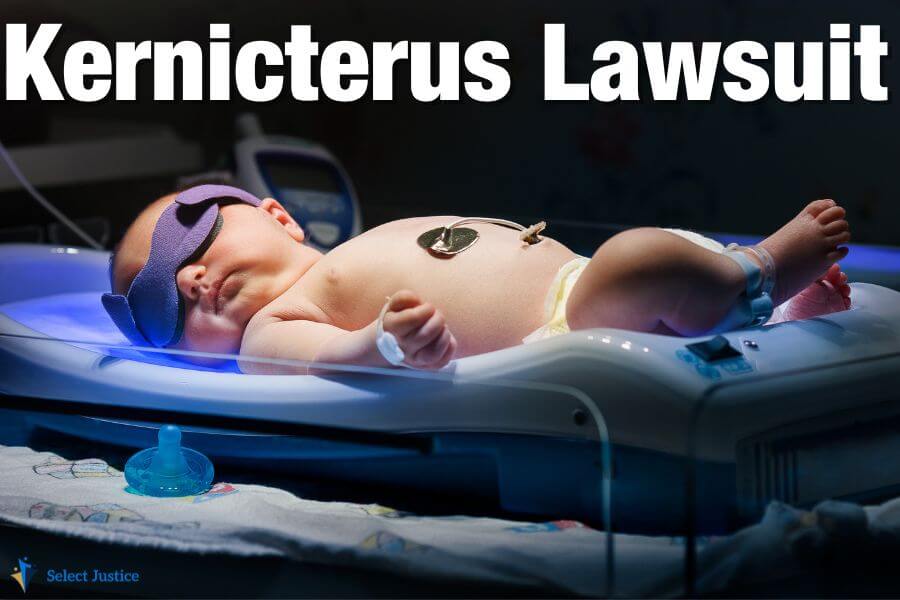Kernicterus is a rare brain condition caused by severe jaundice that has been left untreated. Jaundice occurs when a substance called bilirubin builds up in the body and spreads through the nervous system. Bilirubin is normally removed by the liver – a mother’s liver will remove a baby’s bilirubin during pregnancy – but newborn babies’ livers are sometimes not developed enough to this effectively, leading to a buildup of bilirubin in the child’s blood, and potentially causing kernicterus if left untreated. Kernicterus can lead to a wide range of health problems, ranging from hearing loss to cerebral palsy. Kernicterus is difficult to treat and broadly viewed as irreversible. However, the condition is highly preventable, given the easily spotted warning signs of high jaundice levels. As such, some parents with newborns who have contracted kernicterus are pursuing lawsuits for negligence and medical malpractice against the people and institutions tasked with caring for their infants.
As mentioned, kernicterus is preventable. In fact, the CDC clearly states that “no baby should develop brain damage from untreated jaundice.” The point being made by the CDC is that a newborn should be constantly monitored (it recommends 8-12 hours per day) for jaundice in the early days of its life. However, there are other symptoms and warning signs of kernicterus that can be identified:
Kernicterus Newborn Symptoms
Symptoms of kernicterus in a newborn may include:
- Very yellow or orange skin (a common sign of severe jaundice)
- Problems sleeping or waking up
- Problems passing urine; no wet or dirty diapers
- Sudden fussiness or signs of discomfort
- Uncontrollable/incessant crying
- Arched body (like a bow), or stiff and limp body
- Strange eye movements
Kernicterus Adult Symptoms
Symptoms of adult kernicterus include:
- Lack of energy, lethargy
- Lack of appetite
- Fever
- Vomiting
- Muscle spasms
Note the above is not an exhaustive list of kernicterus symptoms in babies or adults. Moreover, some of the common symptoms of kernicterus may indicate another illness or disease. If you are worried about kernicterus, you should contact your doctor immediately.
It is important to note that kernicterus is almost wholly irreversible, so many kernicterus side effects are considered permanent.
Kernicterus Long-Term Side Effects
- Movement problems
- Cerebral palsy
- Abnormal development in newborns
- Hearing loss
- Loss of motor functions
- Death
Kernicterus short-term side effects
- Nausea, vomiting.
- Lethargy
- Eating problems
- Sleep issues
According to the Centers for Disease Control and Prevention, around 60% of newborns will have jaundice, most of which is considered mild and unserious. However, if left untreated, severe jaundice can develop into Kernicterus, which is a serious type of brain damage. Kernicterus can also damage the child’s spinal cord.
Kernicterus is very rare in adults, although it can occur. Kernicterus is caused in adults for the same reasons as newborns – dangerously high bilirubin levels. However, high bilirubin levels can be caused by rare diseases like Gilbert’s Syndrome and Rotor Syndrome.
Kernicterus is caused by high levels of bilirubin in the body. All of our bodies produce bilirubin – it is, in fact, necessary for us to function – and it is the job of our liver to dispose of it. Often, newborns’ livers aren’t fully developed and have an inability to pass the bilirubin through the liver and excrete it. Bilirubin levels are monitored using measurements called transcutaneous bilirubin (TcB) or total serum bilirubin (TSB). If either level is high, then the baby (or adult) is at risk of developing severe jaundice and, ultimately, kernicterus.
The main signs of kernicterus are linked to the signs of jaundice, i.e., yellow or orange discoloring of the skin and eyes. However, other signs of kernicterus can include severe lethargy, vomiting, nausea, sleeping issues, eating problems, missing reflexes, limpness and stiffness, and unusual eye movements.
Broadly speaking, there are three main stages of kernicterus. The first stage (within 24 hours) is characterized by high levels of jaundice. Alongside the yellowing of the skin, the baby may have difficulty latching to the breast for feeding, present unusual reflexes, be overly lethargic, and have low muscle tone. In the second stage, the infant may experience seizures, incessant crying, and a protruded fontanel (the soft spot at the top of the infant’s head). Finally, the infant may suffer from more severe fits, muscle seizures, and arching of the back and neck.
Currently, there is no effective treatment for kernicterus specifically. As mentioned, there are various ways to treat jaundice and, therefore, prevent kernicterus. Some of the problems associated with kernicterus can be treated, but some, such as cerebral palsy, have no cure. Those living with kernicterus may require treatment for the rest of their lives. This can lead to high medical costs, loss of earnings, and so on. This would be factored into any kernicterus payout settlement should a successful lawsuit be brought forward against the healthcare providers for medical negligence.
The CDC cites several risk factors for kernicterus and severe jaundice. Please note that the risk factors for kernicterus are essentially the risk factors for severe jaundice, as the latter leads to the former. These include:
- Preterm babies. Babies born before 37 weeks are more likely to develop severe jaundice as their livers may not be fully formed and functional.
- Skin color & ethnicity. Babies with darker skin may be more likely to develop jaundice as the yellowing of the skin may be harder to detect. Babies of Mediterranean or East Asian descent may also be at higher risk.
- If a baby is not feeding well in the early days of its life, it may be at a higher risk of kernicterus.
- A baby born with a large number of bruises may be at higher risk of kernicterus as the healing of bruises causes the body to make more bilirubin.
- Blood type. Mothers with O blood type or RH negative blood factor have a higher chance of having babies with high bilirubin levels.
As we have said repeatedly, kernicterus is a serious disorder that impacts the brain. It does not have a cure. However, it is highly preventable as long as the warning signs of severe jaundice are monitored and treated. As such, those who believe their children have contracted kernicterus that was preventable may pursue lawsuits against those who had a duty of care to monitor the health of the child. It could be doctors, nurses, or the healthcare provider. Each case would be different in a kernicterus lawsuit, with different levels of kernicterus compensation paid out due to various factors, including the level of damage done, the amount of negligence proven, the medical costs, and so on.
What is Kernicterus disease in a newborn?
Kernicterus is a type of brain damage/disorder that is caused by severe jaundice. It can lead to several permanent issues, including cerebral palsy and hearing loss.
Can Kernicterus occur in adults?
Yes, although it is much rarer to see kernicterus in adults. It mostly affects newborns.
How long does it take for Kernicterus to develop?
Kernicterus can develop within days of giving birth. It often shows up between 2-5 days after birth as the newborn’s liver cannot process bilirubin properly.
Is Kernicterus reversible?
Technically, no. Some may see a lessening of the impact if caught early, and there are some new treatments like deep brain stimulation that have shown some benefit to patients. However, broadly speaking, kernicterus cannot be cured, and neither can some of the disorders it causes.
What are the symptoms of Kernicterus?
Kernicterus symptoms can include yellowing of the skin, lethargy, nausea, muscle spasms, seizures, arching, motor issues, movement problems, and other issues associated with brain damage.
What bilirubin level causes Kernicterus?
A serum level of unconjugated bilirubin over 30mg/dl puts a baby at a high-risk level of kernicterus. There is no specific level that triggers the disorder.
What causes Kernicterus?
Kernicterus is caused by severe jaundice that has been left untreated.
Is Kernicterus curable?
No. But it is preventable. Kernicterus can be prevented by treating the underlying condition – jaundice – that causes it.

Medical Malpractice
Dangerous & Defective Products
Personal Injury Lawsuits
DUI Lawyer Support
Employer Negligence
Mass Tort Lawsuits
Top Class Action Lawsuits
Expertise
Reviews
FAQ






